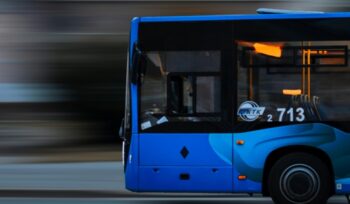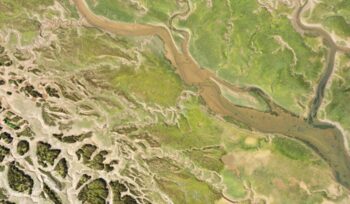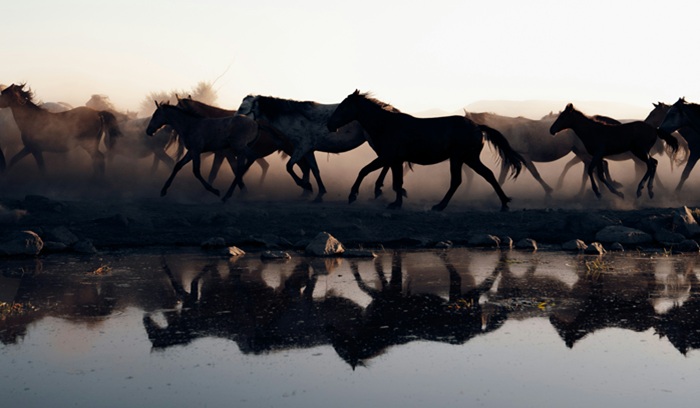The Iberian Highlands of Spain are experiencing a remarkable ecological transformation. For the first time in over 10,000 years, wild horses are once again roaming this landscape. This rewilding project is a significant step in the effort to restore Europe’s natural ecosystems. It is a powerful example of how conservation can repair historical ecological damage. The initiative aims to reintroduce herbivores that play a key role in shaping their environment. It’s a positive and grounded story of nature’s resilience.
A Natural Partnership for the Ecosystem
The horses are not merely a symbol of rewilding; they are an active part of the ecosystem’s recovery. As they graze, they control the overgrowth of shrubs and grasses. This helps to reduce the risk of wildfires, which have become a major threat in the region due to climate change. The horses also create paths through dense vegetation and disperse seeds, which promotes biodiversity. Their presence helps to create a healthier, more balanced landscape, which benefits other species. This method of using natural processes for ecological restoration is a key principle of modern conservation efforts. You can find more information on the benefits of rewilding from the Rewilding Europe Foundation.
Restoring an Ancient Connection
The horses released in this project are a type of primitive horse, carefully selected for their genetics and behavior. They are descendants of ancient horses that roamed the Iberian Peninsula for thousands of years. The reintroduction of these animals reconnects the highlands with their ancient past. This helps to re-establish a more complete and functional food web. This project is part of a growing movement to reintroduce large herbivores to ecosystems around the world, as detailed in reports from organizations like the IUCN.
A Collaborative Effort for Long-Term Success
This ambitious rewilding project is the result of a collaborative effort between several organizations. The Rewilding Europe Foundation, the International Union for Conservation of Nature, and local partners have all played a vital role. The project also involves the local community, which is crucial for its long-term success. Local officials and residents have embraced the initiative, recognizing the potential for both environmental and economic benefits. The project is designed to be a driver of sustainable tourism and a “nature-based economy” that supports the local population. You can read more about the role of local communities in conservation from the United Nations Development Programme.
A Beacon of Hope for Global Conservation
The return of wild horses to the Iberian Highlands is more than just a local success story. It serves as a beacon of hope for global conservation efforts. It demonstrates that with careful planning and collaboration, it is possible to repair ecosystems and restore biodiversity on a large scale. This project is a tangible example of a hopeful future for our planet. It shows that we can actively work to reverse environmental damage and create a more resilient world. The long-term monitoring of this project will provide valuable data for future rewilding initiatives across the globe.
- For further details on the project, the official website for Rewilding Spain provides more information.
More Good News
-

Senegal launches all-electric bus network powered by renewable energy
Senegal has successfully launched a transformative Bus Rapid Transit system in Dakar, featuring a fleet of 121 fully electric buses. As the first network in Sub-Saharan Africa to operate entirely on renewable energy, the initiative utilizes local solar power to transport up to 300,000 passengers daily. By utilizing dedicated lanes, the clean energy fleet cuts cross-city commute times in half while preventing nearly 60,000 tons of carbon dioxide emissions annually. This monumental project dramatically improves urban air quality and establishes Senegal as a pioneering leader in sustainable, green public infrastructure.
-

Yangtze River showing remarkable ecological recovery following fishing ban
China’s Yangtze River is experiencing a remarkable ecological revival five years into a sweeping ten-year commercial fishing ban. Recent surveys reveal significant increases in overall fish biomass and the heartening return of critically endangered species in the world’s fifth largest river. Furthermore, thousands of former commercial fishers have been successfully transitioned into new roles as official river guardians. This massive conservation effort offers a hopeful, replicable model for global freshwater restoration.
-

Rob Jetten becomes The Netherland’s first openly gay prime minister
In a historic victory for representation and progressive politics, Rob Jetten has been sworn in as the first openly gay Prime Minister of the Netherlands. At 38 years old, the centrist Democrats 66 leader is also the youngest head of government in Dutch history. Jetten successfully formed a minority coalition government following a tense election that defeated far-right populist opponents. His platform prioritizes climate investment, economic fairness, and strong international collaboration. Jetten’s premiership powerfully reaffirms the Netherlands’ global legacy as a pioneer of LGBTQ+ equality and inclusive, cooperative democratic leadership.
-

Millions of New York City workers gain additional time off through new law
Millions of workers in New York City are benefiting from a major expansion of the Protected Time Off Law, which officially took effect in late February 2026. The progressive legislation grants employees an additional 32 hours of unpaid, protected leave that is available immediately upon hire or at the start of the calendar year. This ensures workers do not have to wait to accrue hours before addressing sudden medical emergencies or family crises. The law also vastly expands permitted uses to include mental health care, public disaster recovery, and caring for disabled loved ones.
-

Malaysia bans electronic waste imports to protect the environment and public health
In a monumental victory for public health and environmental justice, Malaysia has enacted an immediate and absolute ban on the importation of electronic waste. By removing regulatory loopholes and launching a strict enforcement campaign, the nation is successfully preventing toxic heavy metals from polluting its soil and waterways. Authorities have already intercepted hundreds of thousands of kilograms of illegal e-waste at major ports, vowing to return the hazardous materials to their countries of origin. This decisive action establishes Malaysia as a leading force in Southeast Asia’s growing movement to reject global waste and prioritize ecological sustainability.
